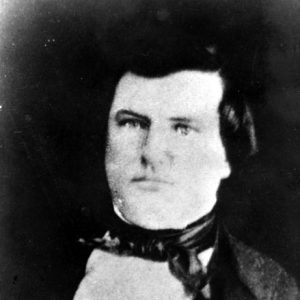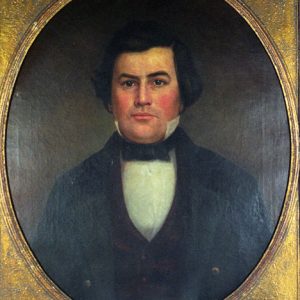calsfoundation@cals.org
John Selden Roane (1817–1867)
Fourth Governor (1849–1852)
John Selden Roane was a lawyer, planter, soldier, and governor of Arkansas. He is best known for his service in the Mexican War and his efforts to deal with the state’s financial crisis following the failure of its banking system.
John Roane, the son of storekeeper and slaveholder Hugh Roane and Hannah (Calhoun) Roane, was born in Lebanon, Tennessee, on January 8, 1817. He was part of a prominent political family, and his uncle Archibald Roane served as governor of Tennessee from 1801 to 1803.
John Roane was educated in a Tennessee common school and later attended Cumberland College in Princeton, Kentucky. Roane moved to Arkansas in 1837 and settled in Pine Bluff (Jefferson County), where he studied law under his older brother, Samuel Calhoun Roane, a leading jurist and owner of one of Arkansas’s largest plantations. With his elder brother’s influence and patronage, John Roane moved easily and comfortably into the frontier elite.
On November 15, 1840, with the help of his brother, he was elected the first prosecuting attorney of the newly created Second Judicial District, which was headquartered in Van Buren (Crawford County). In 1842, he returned to Jefferson County and, on September 19, was elected Democratic representative to the Fourth Arkansas General Assembly. In 1844, he went back to Van Buren and was elected to serve in the Fifth General Assembly, which convened in November of that year. The Assembly, by a vote of thirty-six to thirty-two, elected him speaker.
Roane probably would have run for another term had it not been for the start of the Mexican War. He raised a company of mounted infantry from Van Buren and took them to Washington (Hempstead County), where they became part of the First Arkansas Mounted Rifles. The men elected Roane lieutenant colonel, and the regiment set off for Mexico. The unit, led by men with almost no military experience, was poorly trained and performed badly at the Battle of Buena Vista on February 22–23, 1847. The performance of the regiment became the subject of heated controversy and led, that summer, to a duel between one of its captains, Albert Pike, and Roane. Neither man was hurt in the Pike-Roane Duel.
Roane returned to Pine Bluff after the war and occupied himself with overseeing a newly acquired plantation and practicing law. By 1860, he owned fifty-six slaves. Roane remained in private life until 1849, when the impending resignation of Governor Thomas Stevenson Drew lured him back into politics. The Democratic caucus, which began meeting on December 8, 1848, nominated Roane on the fifth ballot by a vote of forty-four to twenty-four. Roane was not especially popular with rank-and-file Democrats outside the caucus, but neither the faction in power (known as the “Family”) nor its opponents had any particular objections to him, and serious opposition failed to coalesce in support of an alternative Democratic candidate. In the March 14, 1849, he barely won a special election against Cyrus W. Wilson, a little known Whig who was serving as a state senator from Pulaski and Perry counties. The final vote was 3,486 for Roane and 3,323 for Wilson.
As governor, Roane supported internal improvements, the establishment of a state college (though he was hostile to publicly supported common school education), and the recruitment of immigrants to Arkansas. He hoped to finance his program not by tax revenue but by using the proceeds from the sale of federal lands that were turned back to the states. However, the General Assembly passed a series of distribution bills that gave the money to pet projects in the districts that the legislators represented. Roane knew that Arkansas’s most serious challenge was to find a way to get enough revenue to restore the state’s financial credit after the disastrous failure of the state’s established banks, the State Bank and the Real Estate Bank. The General Assembly responded to the very real crisis by ignoring Roane’s proposals. The Assembly further undermined the financial stability of the state by lowering the tax base and thus reducing tax revenues, failing to force the collection of individual overdue loans owed to the State Bank, and refusing to repeal the distribution laws.
On national issues, Roane sympathized with the Southern radicals, believing that the states were sovereign bodies, that slaves were property, that Congress had no right to restrict the taking of such property into the territories, and that any state had the right to leave the Union. The Arkansas General Assembly had so frustrated Roane’s efforts to deal with the serious financial crisis in the state that he chose not to seek reelection in 1852. He returned to his plantation in Pine Bluff and never held public office again. On July 5, 1855, Roane married Mary Kimbrough Smith; they had five children.
Roane was in Pine Bluff at the beginning of the Civil War, but he did not enter the service for almost a year. On March 20, 1862, he finally received a commission as a brigadier general in the Confederate army and then served as the de facto commander in Arkansas until he was replaced in the early summer of 1862 by Major General Thomas C. Hindman. He later commanded a brigade at the Battle of Prairie Grove on December 7, 1862, and then served on garrison and detached duties in Arkansas, Louisiana, and Texas until the end of the war. He showed little talent for military service and was not well liked by his superiors or the men he led. After the war, Roane returned to Pine Bluff, where he died on April 8, 1867. He is buried in Oakland Cemetery in Little Rock (Pulaski County).
For additional information:
Donovan, Timothy P., Willard B. Gatewood Jr., and Jeannie M. Whayne, eds. The Governors of Arkansas: Essays in Political Biography. 2nd ed. Fayetteville: University of Arkansas Press, 1995.
Bobby Roberts
Central Arkansas Library System
This entry, originally published in Arkansas Biography: A Collection of Notable Lives, appears in the CALS Encyclopedia of Arkansas in an altered form. Arkansas Biography is available from the University of Arkansas Press.
 Louisiana Purchase through Early Statehood, 1803 through 1860
Louisiana Purchase through Early Statehood, 1803 through 1860 Politics and Government
Politics and Government John Roane
John Roane  John Roane
John Roane 



Comments
No comments on this entry yet.